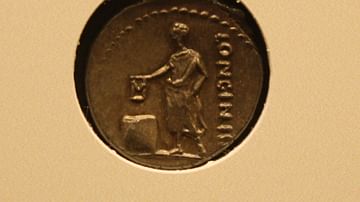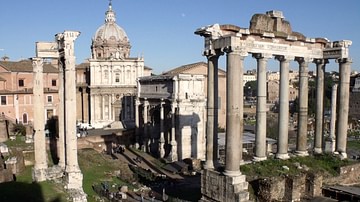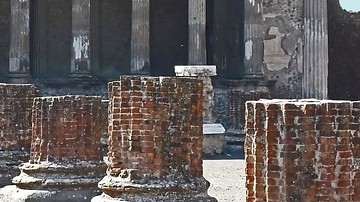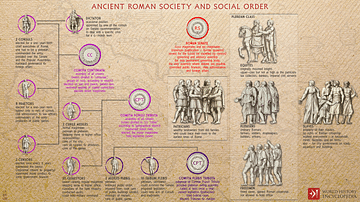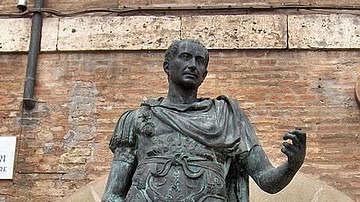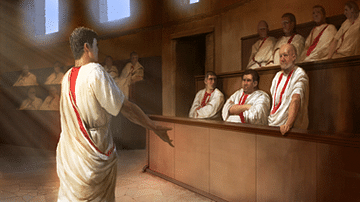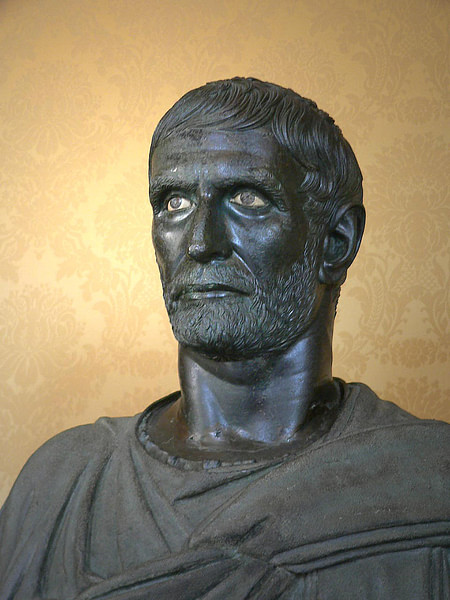
The 4th century BCE Greek philosopher Aristotle once wrote in his essay Politics, “If liberty and equality…are chiefly to be found in democracy, they will be best attained when all persons alike share in the government to the utmost.” Regrettably for Rome, when the Etruscan king was finally ousted in 509 BCE, the aristocratic families of the city - the Patricians - seized control of the government and created a republic, but a republic in name only. The noble patricians considered themselves privileged and better capable of ruling; certain people were born to lead and others were destined to follow. The majority of the citizens, the plebians, were denied any part in how, or by whom, they were ruled.
During the rule of the Etruscan kings, the patricians (the word comes from the Latin patres meaning “fathers”) owned most of the land, and while there were many wealthy plebians (a word meaning “the many”), a handful of patrician families rose to become advisors and warlords to the king, although some historians argue that even the king may not have always been a patrician. For decades to come, all patrician families could trace their ancestry to these original clans. Among these were the Claudii, the Julii or the Cornelii. This natural born right, the right to govern, became hereditary and thereby allowed the patricians to distinguish themselves from those they considered a lower class. With the advent of the republic, the patricians sought to maintain this hold on governmental power.
This new government was truly unique and, in all appearances, representative. There was a centuriate assembly or Comitia Centuriate, a Senate, and two co-consuls. The latter were elected by the assembly for a one-year term but had the power of a king. All of this was open only to the patricians and only concerned their welfare. This extreme authority allowed them to sustain both their economic and political status, but this was not the only method used to suppress the plebians. Another way was through the priesthood - something they would control for years to come. Religion had always been an integral part of a Roman citizen's life, and one method of suppressing any possible rebellion among the plebians was for the patricians to maintain their role as the “gatekeepers to the gods.” They dominated both the college of priests and the position of pontifex maximus. The patricians simply claimed to have special knowledge of the gods and therefore served as custodians of religious law with authority to punish offenders.
Unfortunately for the patricians, this dominance would and could not last. There had always been little, if any, relationship between the two classes - by law they were even forbidden to intermarry. The patricians gradually began to lose control when many of the more wealthy plebians wished to secure some voice in the government, threatening, more than once, to leave Rome. As the majority of the Roman citizenry, the plebians were a diverse group. They were the urban poor, wealthy farmers, tradesmen, as well as the core of the Republican army. The menial positions of tradesman or craftsman were never considered a job for a patrician; he believed he was better suited for leadership positions in politics, law, or the army. However, the patricians realized they needed the plebians more than the plebians need them and decided to relinquish some, but not all, authority. Unfortunately, this battle between the two classes would continue for decades to come.
This threat to abandon the city eventually brought about a compromise: the Conflict or Struggle of Orders, an agreement between the two classes that allowed the plebians to have a voice in government. The Concilium Plebis or Council of the Plebs, a legislative assembly that would make laws relative to the concerns of the plebians, was created in 494 BCE. Over two centuries later, in 287 BCE, the Lex Hortensia was passed, making all laws enacted by the plebian assembly binding to all citizens, patricians included. Initially, two officials or tribunes were elected by the Council to act on behalf of the plebians, but this number was later increased to ten. However, the creation of the Council was not enough. Without any law code in place, the plebians feared possible abuses by the patricians, so a series of laws, the Twelve Tables, was enacted in 450 BCE. These laws proved to be the foundation for Roman justice; one law that remained, and was later discarded, was the prohibition against intermarriage between the two classes.
The Roman author and historian Livy wrote in his History of Rome of the patricians' concern for maintaining the purity of their class:
… a tribune of the plebs, introduced a law with regard to the intermarriage of patricians and plebeians. The patricians considered that their blood would be contaminated by it and the special rights of the houses thrown into confusion. Then the plebeians … brought in a measure empowering the people to elect consuls from the plebeians or the patricians as they chose. The patricians believed that, if this were carried, the supreme power would not only be degraded … but would entirely pass away from the chief men in the State into the hands of the plebs.
This latter concern was not so easily dismissed by either side. Gradually, as time passed, laws were relaxed, allowing plebians to become consuls, the first one elected in 367 BCE.
As the plebians began to obtain more and more control of their own government, several of them rose to the level of a dictator, a position that allowed an individual to assume supreme power in times of an emergency. Tiberius Gracchus, a 2nd century BCE tribune whose mother was a patrician, proposed land should be given freely to the poor and unemployed farmers, an idea not widely popular to many of the wealthy patricians in the Senate. Tiberius was killed, along with 300 of his followers. His brother Gaius would fair no better. In 81 BCE, Sulla, another tribune, rose to power, also assuming the title of dictator. One of his first moves was to eliminate all opposition, executing over 1500 patricians, although some chose to commit suicide in order to allow their families to keep their wealth; an executed individual would have relinquished all wealth to Sulla.
As time passed the patrician class still maintained some influence within the government, largely due to their wealth and land ownership. Unfortunately, the old idea of birthright changed; identity with the old clans was no longer valid. Julius Caesar established new patricians from the plebian class in order to strengthen his power. Emperor Augustus also named new patrician families in an attempt to create a revitalized sense of morality within the empire, along with loyalty to the state cults. He reestablished the old priestly colleges (naming himself pontifex maximus) and rebuilt old temples and shrines. And, while the patrician class would exist long into the Byzantine Empire, it was not the same as the small group of families who established the Republic. Emperor Constantine would use the term “patrician” only as a title. The original patricians' attempt at controlling the power within the Republic had been short-lived, for the plebians chose to rise up and demand a voice. As Aristotle stated, a democracy or a republic can only truly exist when all people participate.

